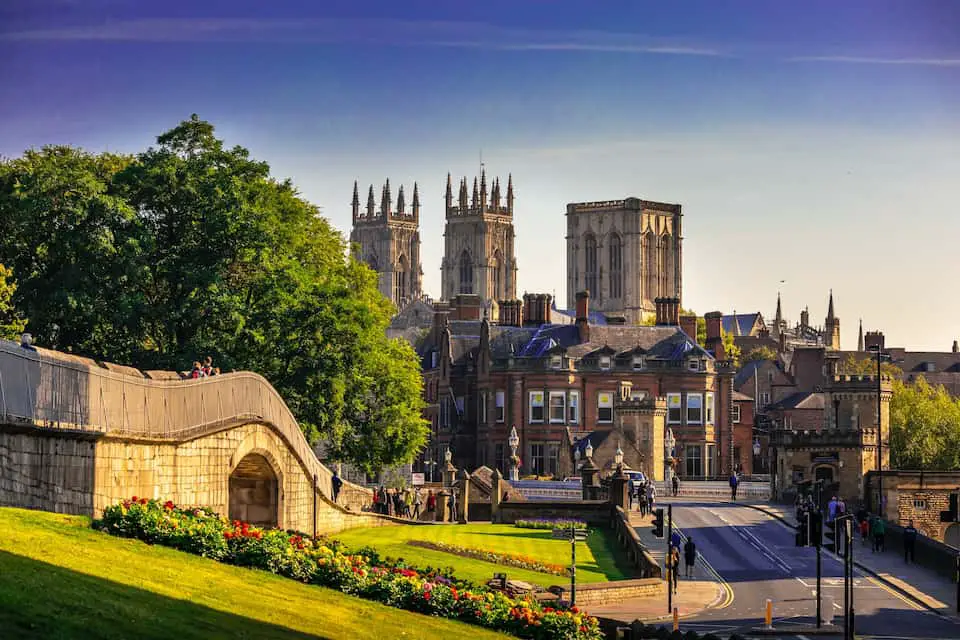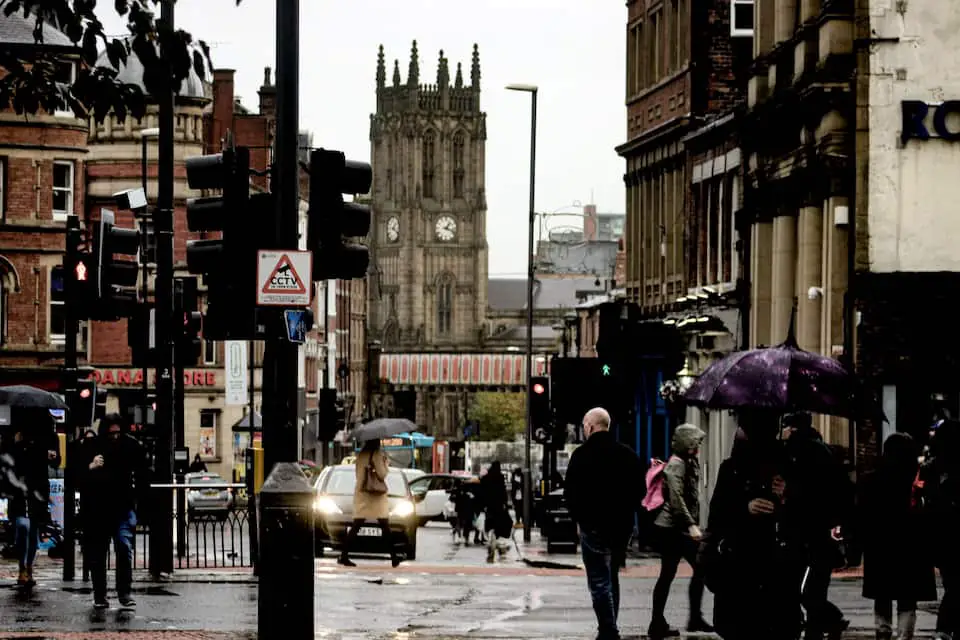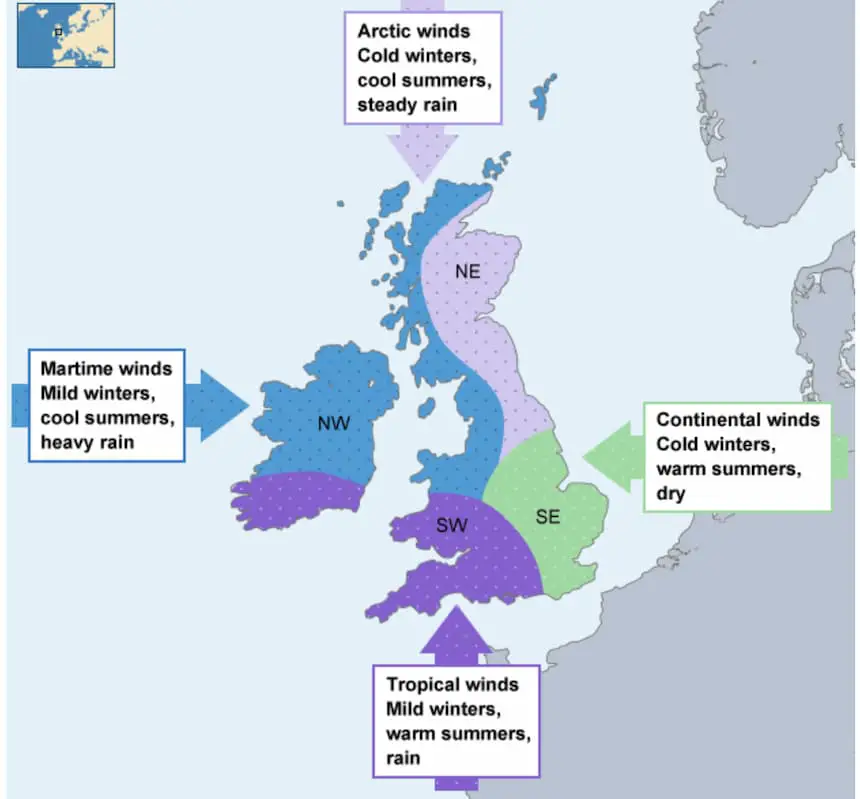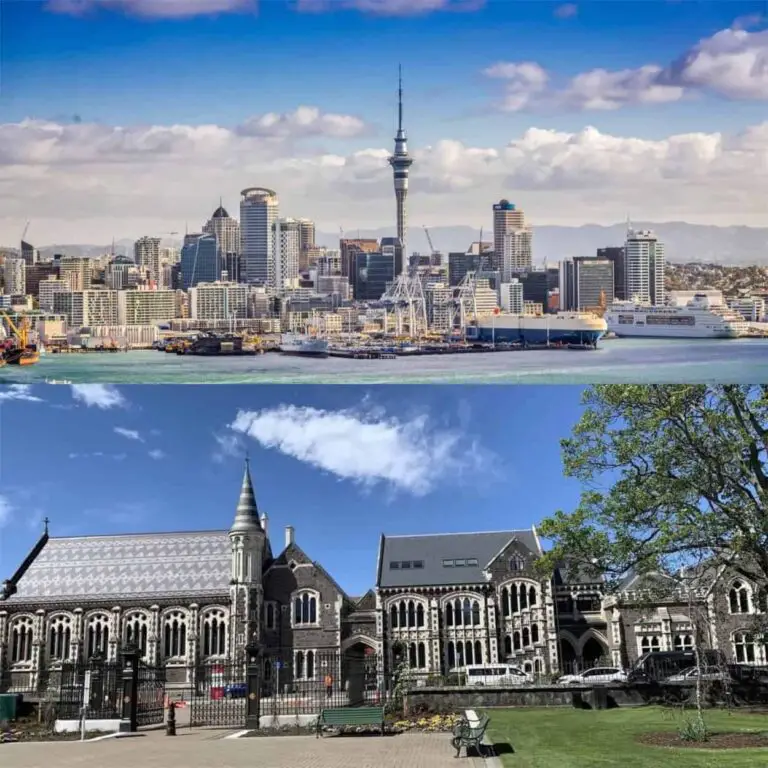New Zealand vs UK: Which Country Is Better For Living? [2024]

Many Brits move from the UK to New Zealand in search of a better climate, outdoors, and quality of life. At the same time, both the UK and New Zealand are high on the immigrant’s list thanks to their job & study opportunities and English as an official language.
Mainly due to its past, New Zealand is a popular country among the British. The UK and New Zealand are two great countries regarding the quality of life, education, and work-life balance. The biggest differences between them are climate, nature, and location. These factors might influence your decision on where to move.
New Zealand is more of a provincial country with a relaxed lifestyle. On the other hand, the UK has a larger economy & population, thus more economic opportunities (aside from the class system), and is nowhere near as boring.
New Zealand is much more peaceful and has far easier access to the outdoors. In both countries, the people are friendly and have a great sense of humor. Read on to learn where each country scores better and which one of them you should choose for a relocation abroad.
Also, check out our article that compares living in Ireland vs New Zealand and the cost of living in the UK vs New Zealand.
Pros and cons of living in New Zealand
Pros
- Beautiful nature and landscape
- Laid back lifestyle
- A lot of space
- Various travel opportunities within the country
- Beautiful beaches and mountains – perfect for outdoors
- Temperate climate with a lot of sunshine
- Diversity within one country
- International environment – immigrant country
- Open-minded and welcoming to foreigners
- Free healthcare
- Decent salaries
- Great work-life balance
- Long paid leave
- Very kids friendly
- Great environment for families
- Affordable education
- Empty roads
- Friendly people
- Remote
Cons
- High cost of living
- Not many large cities
- Remote location
- Low-quality and expensive housing
- High home prices
- Lack of infrastructure like public transport
- Not salaries
- Limited career opportunities for some occupations
- Lack of history, culture, architecture
- Dangerous sun
- Tall Poppy Syndrome
- Possible earthquakes and volcano eruptions
Pros and cons of living in the UK
Pros
- Traveling is cheap and fast
- Central location
- Houses are well built
- Great job opportunities for various professionals
- Large economy
- Developed and accessible public transportation
- Huge pub culture
- Long history and cultural heritage
- Various festivals and celebrations
- Beautiful landscapes
- Some of the best universities in the world
Cons
- Not amazing weather – expect a lot of rain
- Dark and cold winters
- Very high housing prices in London
- Very densely populated
- Employees do overtime
- Salaries aren’t very high
- High cost of living in some locations
- Brexit
Country comparison New Zealand vs the UK

Here is a general comparison of both places to give you a quick overview:
| The UK | New Zealand | |
|---|---|---|
| Area | 243,610 km² | 267,710 km² |
| Population | 67,327,000 | 5,123,000 |
| Population density/km² | 276.4 | 19.1 |
| Average age | 40.6 years | 37.2 years |
| Climate (0 bad, 100 excellent) | 6 | 36 |
| Cost of living (0 bad, 100 excellent) | 34 | 26 |
| Health (0 bad, 100 excellent) | 78 | 81 |
| Unemployment rate | 4,5 | 4,1 |
| Average income | US$45,380 | US$45,340 |
| Daytime temperatures | 12.9 °C | 17.4 °C |
| Sunshine hours per day (average) | 3,8 | 5,8 |
| Rain days per month | 13 | 10,6 |
Nature and outdoors
Which country has more beautiful nature and outdoor activities?
New Zealand is famous for its magical scenery. Not without reason, many movies picturing fantastic landscapes were filmed here, think of The Lord of the Rings.
Moreover, in New Zealand, you can find everything; beaches, forests, mountains, rivers, volcanoes, and even fjords.
Nature is indeed more diverse in New Zealand than it’s in the UK.
At the same time, the UK has got some beautiful nature too. It’s popular for green hills, lakes, river valleys, national parks, and even beaches. However, it might be too cold to swim.
New Zealand has a temperate climate, which means it’s never very hot, and it’s never very cold. Summers are relatively warm and dry from December to February. Winters are mild but also wet, from June to August. You can experience snow and freezing temperatures on the South Island of New Zealand.
This climate gives you the opportunity to enjoy the outdoors all year round. While in the UK, summer can be very hot at times, and winter can be pretty cold that you don’t want to go outside.
In both countries, climates differ depending on where you live. South Island weather is significantly different from the North Island.
Quality of life
To understand more about the quality of life, we compare the results of the international Better Life Index from the OECD. They rank countries across the world according to several factors like housing, income, environment, and much more.
Let’s see how they rate New Zealand and the UK in the latest edition.
New Zealand
Overall, New Zealand ranks 10th worldwide for the quality of life, scoring highly for economic and political stability, safety, and the quality of its education system.
Below you can see the quality of life indicators for New Zealand. The maximum score is 10; the higher the number, the better.
- Housing: 6,8
- Income: 6,0
- Jobs: 8,3
- Community: 8,5
- Education: 7,0
- Environment: 8,1
- Civic engagement: 7,5
- Health: 9,2
- Life satisfaction: 7,9
- Safety: 7,3
- Work-life balance: 4,9
Furthermore, the largest city, Auckland, was ranked 3rd in the Mercer Quality of Life index. This ranking considers things like the environment, political stability, health, weather, housing, and other factors. The capital of New Zealand, Wellington, scored 15th.
That said, the first UK city that appears on this ranking is London, and it took only place 41. That might tell you something about the quality of life in these countries.
From a general perspective, New Zealand does great in factors like natural beauty & nature, weather, healthcare, political stability, cultural diversity, tolerance of other races & cultures, and the amount of pollution.
Moreover, New Zealand outperforms in average income, jobs, education, life satisfaction, health, environmental quality, civic engagement, and life satisfaction. New Zealanders give a 7.3 grade regarding their general satisfaction with life.
At the same time, the UK has higher wages or better opportunities to earn a higher salary, a stronger economy, a lot of opportunities to travel, endless culture, and a long history.
Moreover, the country has no shortage of exports and imports; you can quickly and cheaply get anything you will ever need or want.
In New Zealand, the average household net-adjusted disposable income per capita is US$39,024 yearly, more than the OECD average of US$30,490.
Environment
Only a few countries can beat New Zealand in terms of the environment. The air only has a PM2.5 level of 6 micrograms per cubic meter. It’s one of the lowest levels in the OECD, with an average of 14 mg.
The UK is also a pretty clean place with a level of PM2.5 averaging 10.1 micrograms per cubic meter. It’s also below the OECD average of 14 micrograms.
Learn more about the qualify of life in New Zealand in our YT video:
The UK
Below you can see how the UK scores in quality of life according to the OECD (the maximum score is 10; the higher the number, the better):
- Housing: 6,5
- Income: 5,4
- Jobs: 8,4
- Community: 7,3
- Education: 6,7
- Environment: 6,8
- Civic engagement: 7,1
- Health: 7,8
- Life satisfaction: 6,4
- Safety: 8,6
- Work-life balance: 5,6
The UK has a slightly better score for jobs, safety, and work-life balance.
In the UK, you have a lower average net income than in New Zealand (US$33,049 vs US$39,024), but it’s still higher than the OECD average of US$30,490 a year.
About 11% of all employees in the UK work very long hours.
About 75% of people aged 15 to 64 in the UK have a paid job, which is a good rate. Life expectancy in the UK is around 81 years.
British culture
If you are looking for history and culture, the choice is obvious. England is one of the oldest countries in the world, with an incredible heritage and a very well-defined culture. There is unlikely a culturally richer place than the UK on this planet.
In fact, all regions of the UK, e.g., England, Scotland, Wales, and Northern Ireland, differ in terms of language, dialect, food, customs, and traditions.
This makes the UK an exciting and interesting place to live.
Salaries

The UK median salary for full-time workers in 2022 was about £33,000 across the country and £41,866 in London. In New Zealand, the average salary was $63,360 or £32,876 in 2022.
Generally, you can expect slightly higher average salaries in New Zealand; however, the cost of living is also higher.
New Zealand
In 2023, the minimum wage was $22.70 per hour. The median income was about $27 per hour as of 2021 ($56,160 per annum based on a 40-hour week).
That comes to $5,280 (£2,739) monthly or $63,360 (£32,876) annually for men and $4,220 (£2,189) monthly, and $50,640 (£26,276) annually for women.
On average, people in New Zealand earn about US$45,269 per year ($70,789), which is less than the OECD average of US$49,165.
At the same time, the net income in the average household is about US$39,024 ($61,023) annually.
On 1 November 2022, the average salary in Auckland was $4,649 or $55,788 annually. Larger companies pay more, so medium-sized businesses with more than 100 employees pay $5,114 ($61,728) per month, and largest corporations pay $6,508 ($78,096) and more.
With salaries all clear, but how much do you need to make to live comfortably in such an expensive place like New Zealand? According to our estimations, you would need at least $50,000 (£26,215) to live in any city.
In the UK, it’s about £30,000 per year or £2,000 to £3,000 net per month. These numbers assume you are single and renting a single house/apartment.
Below you can see a median wage in various industries in New Zealand (NZD):
| Sector | Median pay | Salary range |
|---|---|---|
| Accounting | $65,000 | $48,000 to $125,000 |
| Agriculture, fishing and forestry | $55,000 | $40,000 to $95,000 |
| Architecture | $75,000 | $50,000 to $125,000 |
| Automotive | $60,000 | $40,000 to $85,000 |
| Banking, finance and insurance | $65,000 | $45,000 to $125,000 |
| Construction and roading | $60,000 | $40,000 to $135,000 |
| Customer service | $48,000 | $40,000 to $65,000 |
| Education | $60,000 | $42,000 to $75,000 |
| Engineering | $75,000 | $48,000 to $130,000 |
| Executive and general management | $85,000 | $48,000 to $195,000 |
| Government and council | $70,000 | $40,000 to $145,000 |
| Healthcare | $55,000 | $40,000 to $85,000 |
| Hospitality and tourism | $50,000 | $40,000 to $65,000 |
| HR and recruitment | $65,000 | $48,000 to $122,000 |
| Information technology (IT) | $105,000 | $50,000 to $200,000 |
| Legal | $65,000 | $45,000 to $125,000 |
| Manufacturing and operations | $48,000 | $40,000 to $75,000 |
| Marketing, media and communications | $70,000 | $45,000 to $135,000 |
| Office and administration | $50,000 | $42,000 to $75,000 |
| Property | $85,000 | $50,000 to $150,000 |
| Retail | $48,000 | $40,000 to $65,000 |
| Sales | $65,000 | $42,000 to $115,000 |
| Science and technology | $65,000 | $42,000 to $115,000 |
| Trades and services | $55,000 | $40,000 to $85,000 |
| Transport and logistics | $50,000 | $40,000 to $80,000 |
Did you know that in New Zealand, you can apply for government support via Work and Income if you don’t earn enough?
The UK
What about salaries in the UK? In 2023, the minimum wage was £10.42 per hour; it’s only slightly lower than in New Zealand.
The average salary ranges between £30,000 and £35,000 per year. The national median wage is £33,000. In 2021, the average salary in the country was £29,600.
Wages are significantly higher in London, where average workers make about £41,866 (2023), which is about 21% higher than the national average.
While the average net income of a UK household is US$33,049 a year.
On average, people in the UK earn about US$47,147 per year, which is slightly less than the OECD average of US$49,165.
| Job title | Average salary |
|---|---|
| Java Developer | £73,898 |
| Enterprise Architect | £73,898 |
| Product manager | £60,656 |
| Full Stack Engineer | £47,320 |
| Data scientist | £49,449 |
| HR Manager | £48,443 |
| Corporate Recruiter | £46,215 |
| HR Business Partner | £50,000 |
To have a comfortable lifestyle as a single in the UK, you are looking at a net income between £2,000 and £3,000 per month. Below you can see average salaries for some of the best jobs to have in the UK.
Taxes
Where do people pay more taxes in the UK or New Zealand? Luckily, the UK isn’t your typical European country where you spend half of your income on taxes.
New Zealand
In 2024 following income tax rates apply:
| Salary (NZ) | Tax rate |
|---|---|
| Up to $14,000 | 10.5% |
| Over $14,000 and up to $48,000 | 17.5% |
| Over $48,000 and up to $70,000 | 30% |
| Over $70,000 and up to $180,000 | 33% |
| Remaining income over $180,000 | 39% |
That said, with an average salary of $55,788 in Auckland, your net annual income will be $45,217 or $3,768 monthly. Hence, you paid only 18.95% in taxes.
The UK
In 2024, the following tax rates apply to employees in the UK:
- Tax-free up to £12,571
- 20% on earnings between £12,571 and £50,270
- 40% on earnings between £50,271 and £150,000
- 45% on earnings over £150,000
That means that you can earn up to £50,270 ($95,878) at a pretty good tax rate, but after exceeding this amount, your taxes grow significantly. While in New Zealand, you can earn up to $180,000 still at a favorable rate of 33%.
Moreover, UK employees contribute an additional 12% to National Insurance (health insurance). This will leave someone with a gross annual income of £40,000 with £30,864 after taxes or £2,572 monthly. You paid 23% in taxes.
In New Zealand, you don’t pay anything additional for insurance from your gross income.
Jobs
Due to the larger economy and population, the UK has more jobs available. It also has a large variety of positions across all possible sectors. The same can not be said about New Zealand.
New Zealand
According to an OECD report, about 77% of employable people in New Zealand have a job. Around 14% of employees work long hours, which is higher than in the UK (11%). That said, New Zealand’s work-life balance is still legendary.
Foreigners have the best chances of employment in the following industries:
- Healthcare and social services
- Construction, various trades, and infrastructure
- Education
- Engineering
- ICT, electronics and telecommunications
- Agriculture and forestry
The UK
About 75% of people in the UK have a job, which is slightly less than in New Zealand.
Expats and foreign workers can find the most job offerings in areas with skill shortages:
- Business services – analysts, market researchers, HR officers
- Construction – surveyors, planners and project managers
- Education – primary and secondary school teachers (particularly maths teachers)
- Engineering – electrical, mechanical and chemical engineers, civil engineers and product and process engineers
- Finances – accountants, bankers, managers
- Healthcare – nurses, medical radiographers and pediatricians
- Hospitality – baristas, chefs
- IT – cyber security analysts, SEO marketers, software developers and systems engineers
- Social care – counselors, social workers
Moreover, the best fields to work in the UK include:
- Accounting, banking and finance
- Consulting and management
- Healthcare
- IT
- Marketing, advertising
- Sales
- Education
- Engineering
- Recruitment and HR
As you can see, the UK has a wider variety of jobs available; hence, people with almost any qualifications can work there. On the other hand, you must have a particular skill or trade to work in New Zealand.
NZ immigration also makes life harder when it comes to working visas. An applicant, generally, must fall into the shortage list to be approved. Learn how to become a New Zealand citizen.
Cost of living

Expats and immigrants must be prepared for the high living expenses they will face in New Zealand. Some items cost significantly more than in the UK, while some are on pair with NZ.
For instance, the costs of buying a house anywhere in New Zealand are close to buying a house in London.
New Zealand
So, to live alone and independently in the country’s largest city Auckland, you should have at least $4,630 (£2,427) monthly to cover the main expenses. A family of four requires around $8,327 per month to live comfortably.
Read the full guide on the cost of living in New Zealand.
Rent will be your biggest pain. In Auckland, you need at least $650 per week or $2,600 (£1,363) per month to rent a house in the suburbs. Bills aren’t included.
Read our guide about salaries in New Zealand vs the UK. And we also have a dedicated guide about New Zealand salaries.
The UK
In the UK, the recommended budget to live on is £3,749 for a family of four and £2,165 ($4,129) for a single person per month. You can also live on less in smaller towns.
That said, the current cost of living in the UK:
- Is more expensive than in 64% of countries in Western Europe (6 out of 14)
- Is more expensive than in 83% of countries in the World (12 out of 63)
Here is a breakdown of typical expenses when living in London:
- Rent: £1,743 per month
- Basic public transport monthly ticket: £146
- Dinner for two in a pub: £37
- 2 theatre tickets: £171
- 1 cocktail in a club: £11
- 1 pint of beer: £5,20
Food is significantly cheaper in the UK than in New Zealand. In fact, you will save 26% on groceries while living in the UK.
The average rental in the greater area of London was £1,599 a month or £369 a week in 2022. The median rent in New Zealand is $450 a week, but in Auckland Central, it’s also more expensive – about $530 for a one-bed place.
Generally, in the UK, you can live comfortably on between £2,000 – £3,000, depending on the location and your personal situation. But you will need at least £2,500 in London.
Cost of living in London:
- Estimated monthly costs for a family of four: £4,954
- Estimated monthly costs for a single: £2,946
Read the full guide about the cost of living in the UK vs New Zealand.
Availability of services and products
In this category, the UK certainly wins, and this is mainly due to the location. New Zealand is one of the most remote places on earth, so shipment of goods that aren’t produced within the country is challenging and expensive.
Besides, the population of New Zealand is too small to have all the services and products. There isn’t enough demand for companies to supply. Hence, it doesn’t make sense financially.
In contrast, the UK is in the center of the world, and its population is 12 times larger than New Zealand. For that reason, residents can enjoy a wide spectrum of goods and services either delivered to them or produced within and outside of the UK.
Housing

The Average New Zealand home has 2.4 rooms per person, while it’s two rooms in the UK. Therefore, you will have more space to yourself on the island.
The average rent in the UK is £1,113 per month (£278 per week), with London being the most expensive area to live in (£1,846). However, the average rent for private renters in England in 2022 was £209 per week.
In New Zealand, most people live in houses, so you are more likely to rent an entire house which usually has two-three bedrooms.
The median rent in Auckland in 2022 is between $595 to $690 (two bedrooms) per week or $2,200 (£1,153) to $2,500 (£1,310) per month (2022).
In Wellington, the capital of New Zealand, the average rent across all types of properties was $575 (£301) in 2022.
However, rents are exponentially rising, and today it’s very hard to find something decent under $650 (£340) per week.
One thing you have to keep in mind is that homes in New Zealand are significantly more expensive than in the UK. Property prices in New Zealand are some of the highest in the world. Expect to pay above $1,000,000 (£524,310) for an average three-bedroom house.
Here are the average house prices in different regions in June 2023:
| Region | Median house price (NZ$) | Change from June 2022 |
|---|---|---|
| Auckland | $1,000,000 | -12.5% |
| Northland | $675,000 | -4.9% |
| Bay of Plenty | $840,000 | -6.7% |
| Gisborne | $575,000 | -7.3% |
| Waikato | $737,300 | -12.2% |
| Taranaki | $570,000 | -0.9% |
| Manawatu- Whanganui | $540,000 | -6.6% |
| Wellington | $765,000 | -9.8% |
| Tasman | $800,000 | -7.5% |
| Hawke’s Bay | $680,000 | -0.7% |
| Otago | $650,000 | -13.3% |
| Nelson | $650,000 | -17.2% |
| Marlborough | $645,000 | -10.4 |
| Canterbury | $655,000 | -4.4% |
| Southland | $423,500 | -5,2% |
| West Coast | $400,000 | +35.4% |
West Coast on the South Island is the cheapest place to buy a home, but it’s very sparsely populated.
In the UK, on the other hand, the average house price was £296,000 in August of 2022. That’s almost twice less than in New Zealand.
If you are willing to live remotely in the UK, you can get a house at a bargain price, e.g., £169,000 in Northern Ireland.
Another critical factor we have to add to housing in New Zealand vs the UK is the quality of houses.
New Zealand’s homes are less durable and built out of timber. You can get a house built as a kit; this is indeed very different from British homes out of stone/brick. Initially, you might feel uncomfortable and less secure in the NZ type of house.
Besides, it’s hard to keep such homes warm and dry as they aren’t well-insulated or double-glazed. However, if you live in a relatively new house, there aren’t many issues.
If your Kiwi home isn’t made well, you might run into the issue of high electricity bills to keep this place warm.
Climate and weather

New Zealand and the UK are quite different when it comes to climate. New Zealand lies in several climate zones, but most of it falls into a temperate climate. Northern New Zealand (Northland) belongs to the sub-tropical climate zone.
Although most of the country is in a temperate climate zone, it still ranges a lot. So in the North, you have the endless summer and areas with mild winters and summers. Some places can be wet all year round, while others are pretty dry (South Island).
In the South Island, it’s generally significantly cooler, with some places being similar to the North Island (Nelson) or the Austrian alpine region (Queenstown).
In New Zealand, you can enjoy the sandy beaches but the snow all year round, depending on where you are. Yes, it has glaciers.
In the UK, the variety is much smaller. The country entirely falls into the temperate climate. Winters are wet, and so are the summers (not always)
The UK has four distinct climate regions:
- South-east – cold winters, warm and dry summers
- South-west – mild and very wet winters, warm and wet summers
- North-west – mild winter, cool summers and heavy rain all year
- North-east – cold winter, cool summers and steady rain all year
You can see it better on a map below:

Healthcare
Both countries offer free healthcare for their residents. Hence, you need to have a resident visa to use this benefit. Otherwise, foreigners can purchase private health insurance to hedge against large expenses.
In the end, healthcare is bloody expensive in both countries.
If you are an employee in the UK, you pay around 12% of your gross salary for health insurance (NHS), while in New Zealand, it’s free.
Even with a subsided healthcare, in New Zealand, everyone must pay a fee of around $40-50 to visit a GP. Only after can you be redirected to the specialist, costs for which are covered by the state.
In the UK, you can visit GPs and specialists for free; however, dentistry and ophthalmology aren’t included in both countries. You must pay out of pocket, which is very pricey.
Before you can qualify for free healthcare in any of these places, we recommend signing up for private insurance like Cigna Global. They operate worldwide.
Best cities to live
Unlike the common belief, Auckland isn’t the best city to live in New Zealand. There are much better options out there, including:
- Wellington
- Christchurch
- Dunedin
- Queenstown
- Tauranga
- Napier
- Taupo
- Nelson
In the UK, London holds the first position if you are an ambitious young professional. Yet, for most people, this place is too busy and stressful. Alternatively, look into these British cities for a good balance between work and quality of life:
- Manchester
- Bristol
- Leeds
- Bath
- Edinburgh
- York
Also read: Living in Canada vs New Zealand.


![Ultimate Guide To Cost of Living in New Zealand vs US [2024]](https://simplenewzealand.com/wp-content/uploads/2023/05/Blank-2-Grids-Collage-min-1-768x768.jpg)




